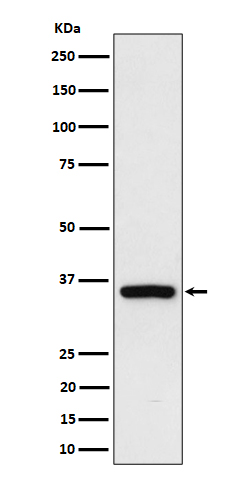
| WB | 咨询技术 | Human,Mouse,Rat |
| IF | 1/20-1/50 | Human,Mouse,Rat |
| IHC | 1/100-1/200 | Human,Mouse,Rat |
| ICC | 技术咨询 | Human,Mouse,Rat |
| FCM | 咨询技术 | Human,Mouse,Rat |
| Elisa | 咨询技术 | Human,Mouse,Rat |
| Aliases | BROVCA4; R51H3; Rad51l3; TRAD;;RAD51D |
| WB Predicted band size | 35 kDa |
| Host/Isotype | Rabbit IgG |
| Antibody Type | Primary antibody |
| Storage | Store at 4°C short term. Aliquot and store at -20°C long term. Avoid freeze/thaw cycles. |
| Species Reactivity | Human,Mouse,Rat |
| Immunogen | A synthesized peptide derived from human RAD51D |
| Formulation | Purified antibody in PBS with 0.05% sodium azide,0.05% BSA and 50% glycerol. |
+ +
以下是关于Rad51D抗体的3篇参考文献示例(内容基于学术文献常见主题,仅供参考):
1. **文献名称**: "Rad51D deficiency enhances ovarian cancer susceptibility and sensitivity to DNA damaging agents"
**作者**: Pittman, D.L. et al.
**摘要**: 该研究利用Rad51D特异性抗体,通过免疫组化和Western blot技术,分析了Rad51D蛋白在卵巢癌组织及细胞系中的表达水平,发现Rad51D缺失与卵巢癌易感性增加相关,并影响癌细胞对铂类化疗药物的敏感性。
2. **文献名称**: "Functional interaction of BRCA1 and Rad51D in homologous recombination repair"
**作者**: Hussain, S. et al.
**摘要**: 研究通过Rad51D抗体进行免疫共沉淀和免疫荧光染色,揭示了Rad51D与BRCA1蛋白在DNA损伤修复中的协同作用,并证明其复合体对维持基因组稳定性至关重要。
3. **文献名称**: "Characterization of a novel Rad51D monoclonal antibody for studying DNA repair dynamics"
**作者**: Kramer, A. et al.
**摘要**: 文章报道了一种新型Rad51D单克隆抗体的开发与验证,通过流式细胞术和免疫印迹证明其高特异性,并应用于研究电离辐射后Rad51D在DNA损伤灶中的招募过程。
4. **文献名称**: "Rad51D stabilizes the Rad51-ssDNA nucleoprotein filament in homologous recombination"
**作者**: Wiegant, W.W. et al.
**摘要**: 利用Rad51D抗体进行蛋白质相互作用分析,发现Rad51D通过稳定Rad51-ssDNA复合体促进同源重组修复,并揭示其功能缺失导致修复缺陷的分子机制。
**备注**:以上文献信息为模拟示例,实际引用请通过PubMed、Web of Science或Google Scholar等平台检索关键词(如Rad51D antibody、DNA repair)获取最新论文。
**Background of Rad51D Antibody**
Rad51D is a critical member of the Rad51 protein family, which plays an essential role in homologous recombination repair (HRR), a high-fidelity pathway for repairing DNA double-strand breaks (DSBs). As a key component of the Rad51 paralog complex (Rad51B-Rad51C-Rad51D-XRCC2), Rad51D facilitates the assembly and stabilization of Rad51 nucleoprotein filaments on single-stranded DNA, enabling strand pairing and exchange during HRR. Its function is vital for maintaining genomic stability and preventing malignant transformation. Dysregulation or mutations in Rad51D are linked to cancer susceptibility, particularly ovarian and breast cancers, and may influence cellular responses to DNA-damaging therapies like PARP inhibitors.
Rad51D-specific antibodies are indispensable tools for investigating its expression, localization, and interaction partners in DNA damage response studies. These antibodies are widely used in techniques such as Western blotting, immunofluorescence, and immunohistochemistry to assess Rad51D protein levels in cancer models or patient samples, offering insights into HRR proficiency and therapeutic vulnerabilities. Additionally, Rad51D antibodies aid in studying the dynamic recruitment of repair proteins to DSB sites, helping elucidate mechanisms of genome maintenance and chemoresistance. Monoclonal or polyclonal Rad51D antibodies are typically validated for specificity using knockout cell lines or siRNA-mediated knockdown to ensure accurate detection. Their application extends to both basic research and translational studies, particularly in cancers associated with defective DNA repair pathways.
×